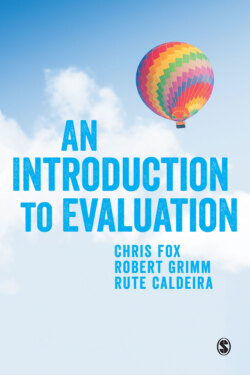Читать книгу An Introduction to Evaluation - Chris Fox - Страница 73
На сайте Литреса книга снята с продажи.
Main characteristics of theories of change
ОглавлениеIn a DFID review of the use of theory of change (Vogel 2012) in international development, the characteristics of the theory of change are defined from the programme side, i.e. in this review Vogel distilled the main common characteristics that programmes with theory of changes have in common. These are as follows:
Logical thinking and critical reflection Theory of change implies mapping the logical sequence that can lead to the desired change(s). This requires critical thinking regarding the context, the intervention, the stakeholders, the targets, and all the other actors and elements that co-relate, interact and play a role in the achievement of the change(s).
Flexibility and openness As an approach, theory of change is not prescriptive when it comes to methods of induction to arrive at an underlying logic and when it comes to assessing the validity of its assumptions. That is, different methods can be used to develop a theory of change, in the same way that theory-based evaluations use whatever methods necessary in order to test assumptions and programmes’ achievement. It’s not about the methods, it’s about the final goal.
Innovation and potential improvement in programmes The characteristics above naturally lead to greater potential for innovation and adaptability to context. As Vogel put it, theory of change ‘[A]s it encourages on-going questioning of what might influence change in the context and drawing on evidence and learning during implementation, theory of change thinking can inspire improvements in programmes, moving beyond technocratic responses towards more realistic and feasible interventions that are responsive to dynamic contexts’ (2012: 4).
Performance management The high level of flexibility and openness also brings uncertainty, which poses considerable challenges for programme management. Performance management approaches are brought in to ‘control’ the levels of uncertainty in TOC informed initiatives.
Overall, programmes with theories of change are challenging because they require ‘a commitment to take a reflective, critical and honest approach to answer difficult questions about how our efforts might influence change, given the political realities, uncertainties and complexities that surround all development initiatives’ (Vogel 2012: 5).
There is not a sole process by which to develop a theory of change. Over the years, many different processes that can arrive at a programmatic TOC have been conceptualised. Broadly these can be grouped in one of the two, or a mix of both processes:
Researcher-led Developing TOCs follows a rigorous research-like process because a few elements that are relevant for the development of a TOC are researched and investigated, e.g. the context. Assumptions may also be formulated more like research hypotheses that can therefore in the future be tested in a more in-depth way.
Stakeholder-led Researchers/programme managers facilitate a process in which stakeholders are central. Stakeholders are provided with the basic information, e.g. of the context but their own perceptions are taken into account. This configures a collective induction exercise whose objective is to generate the collective vision underlying the programme.
Finally, theories of changes may be developed at different points in the life-cycle of a programme. These can be prospective and developed at the initial phase – conceptualisation, planning and design. They can also be retrospective and thus ‘reconstructed’ or pieced together after the programme is fully underway.
